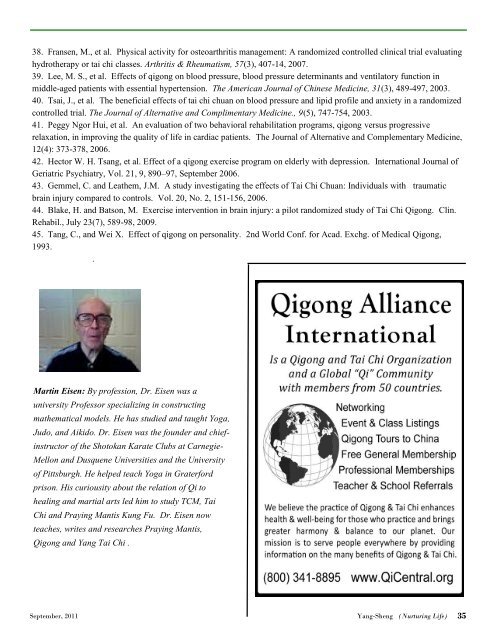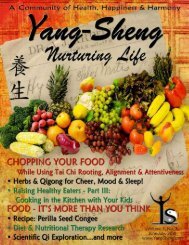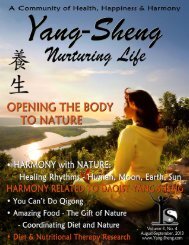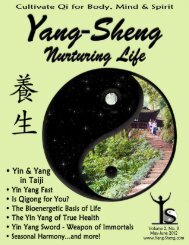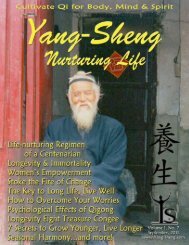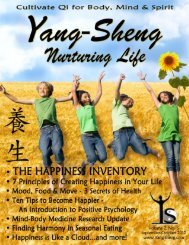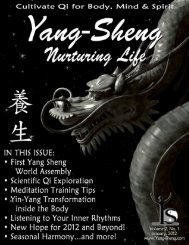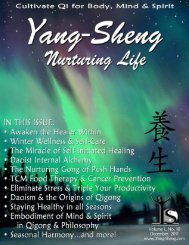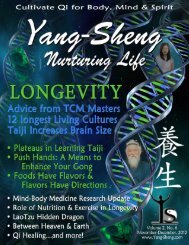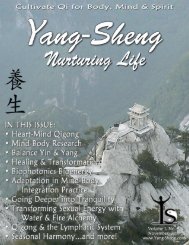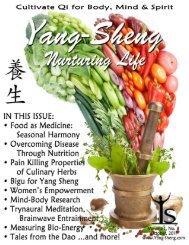Click to download the entire September issue as a PDF - Yang-Sheng
Click to download the entire September issue as a PDF - Yang-Sheng
Click to download the entire September issue as a PDF - Yang-Sheng
Create successful ePaper yourself
Turn your PDF publications into a flip-book with our unique Google optimized e-Paper software.
38. Fransen, M., et al. Physical activity for osteoarthritis management: A randomized controlled clinical trial evaluating<br />
hydro<strong>the</strong>rapy or tai chi cl<strong>as</strong>ses. Arthritis & Rheumatism, 57(3), 407-14, 2007.<br />
39. Lee, M. S., et al. Effects of qigong on blood pressure, blood pressure determinants and ventila<strong>to</strong>ry function in<br />
middle-aged patients with essential hypertension. The American Journal of Chinese Medicine, 31(3), 489-497, 2003.<br />
40. Tsai, J., et al. The beneficial effects of tai chi chuan on blood pressure and lipid profile and anxiety in a randomized<br />
controlled trial. The Journal of Alternative and Complimentary Medicine., 9(5), 747-754, 2003.<br />
41. Peggy Ngor Hui, et al. An evaluation of two behavioral rehabilitation programs, qigong versus progressive<br />
relaxation, in improving <strong>the</strong> quality of life in cardiac patients. The Journal of Alternative and Complementary Medicine,<br />
12(4): 373-378, 2006.<br />
42. Hec<strong>to</strong>r W. H. Tsang, et al. Effect of a qigong exercise program on elderly with depression. International Journal of<br />
Geriatric Psychiatry, Vol. 21, 9, 890–97, <strong>September</strong> 2006.<br />
43. Gemmel, C. and Lea<strong>the</strong>m, J.M. A study investigating <strong>the</strong> effects of Tai Chi Chuan: Individuals with traumatic<br />
brain injury compared <strong>to</strong> controls. Vol. 20, No. 2, 151-156, 2006.<br />
44. Blake, H. and Batson, M. Exercise intervention in brain injury: a pilot randomized study of Tai Chi Qigong. Clin.<br />
Rehabil., July 23(7), 589-98, 2009.<br />
45. Tang, C., and Wei X. Effect of qigong on personality. 2nd World Conf. for Acad. Exchg. of Medical Qigong,<br />
1993.<br />
.<br />
Martin Eisen: By profession, Dr. Eisen w<strong>as</strong> a<br />
university Professor specializing in constructing<br />
ma<strong>the</strong>matical models. He h<strong>as</strong> studied and taught Yoga,<br />
Judo, and Aikido. Dr. Eisen w<strong>as</strong> <strong>the</strong> founder and chiefinstruc<strong>to</strong>r<br />
of <strong>the</strong> Sho<strong>to</strong>kan Karate Clubs at Carnegie-<br />
Mellon and Dusquene Universities and <strong>the</strong> University<br />
of Pittsburgh. He helped teach Yoga in Graterford<br />
prison. His curiousity about <strong>the</strong> relation of Qi <strong>to</strong><br />
healing and martial arts led him <strong>to</strong> study TCM, Tai<br />
Chi and Praying Mantis Kung Fu. Dr. Eisen now<br />
teaches, writes and researches Praying Mantis,<br />
Qigong and <strong>Yang</strong> Tai Chi .<br />
<strong>September</strong>, 2011 <strong>Yang</strong>-<strong>Sheng</strong> (Nurturing Life) 35


